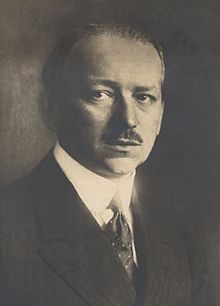Philipp von Langenhan
Philipp von Langenhan (born June 4, 1878 in Czernowitz , Bukowina , † November 14, 1960 in Munich ) was a Bohemian- Austrian politician and industrialist. He was a member of the Austrian House of Representatives and a member of the Provisional National Assembly .
Life
Langenhan was born the son of an industrialist and President of the Chamber of Commerce and was baptized as a Protestant. His ancestors had immigrated from northern Germany. He attended elementary school and a grammar school and subsequently studied law at the University of Chernivtsi as well as at the University of Leipzig and the University of Vienna . He also studied at the commercial academy in Leipzig . He did his military service with the Division Artillery Regiment No. 6 in Vienna and was subsequently employed as a court auscultant in the civil service for three years. Langenhan then worked professionally as an industrialist in Vienna, where he also worked as a member of the board of the German national office. He ran for the German Progress Party in the 1911 Reichsrat election in the electoral district of Böhmen 98 (Bohemia) and was able to achieve 46.5% of the votes in the first ballot. In the runoff election, he was finally able to prevail against the Social Democrat Benno Karpeles with 53.5% . He was sworn in on June 17, 1911 in the Chamber of Deputies of the Reichsrat and was temporarily a member of the committee to deal with economic relations with Hungary (banking committee), member of the committee to negotiate the Bosnian bill, member of the economic committee, member of the defense committee, member of the railway committee , Member of the War Economics Committee and Member of the Committee on State Treaties. After the collapse of the Habsburg Monarchy, Langenhan was a member of the Provisional National Assembly between October 21, 1918 and February 16, 1919 through his Reichsrat mandate in a German-speaking constituency. In addition, after the Peace of Saint-Germain he worked as a liaison between the Sudeten German home office in Austria and the Reich German authorities.
literature
- Fritz Freund: The Austrian House of Representatives. A biographical-statistical handbook, 1911–1917, XII. Legislative period. Publishing house Dr. Rudolf Ludwig, Vienna, p. 335
- Austrian Parliamentary Administration (ed.): The members of the Austrian National Council 1918 - 1975 and the members of the Austrian Federal Council 1920 - 1975. Vienna, Verlag der Österreichischen Staatsdruckerei, 1975
- Stenographic minutes of the House of Representatives of the Reichsrat ( 21st , 22nd session) on ALEX - Historical legal and legal texts online (committee memberships, speeches, motions, etc.)
- Wilhelm Kosch: Biographical State Handbook. Lexicon of politics, press and journalism. Volume 1, 1963
Web links
- Philipp von Langenhan on the website of the Austrian Parliament
| personal data | |
|---|---|
| SURNAME | Langenhan, Philipp von |
| BRIEF DESCRIPTION | Bohemian-Austrian politician and industrialist |
| DATE OF BIRTH | June 4, 1878 |
| PLACE OF BIRTH | Chernivtsi , Bukovina |
| DATE OF DEATH | November 14, 1960 |
| Place of death | Munich |
